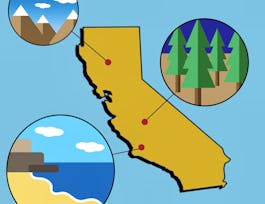Environmental law may be the one institution standing between us and planetary exhaustion. It is also an institution that needs to be reconciled with human liberty and economic aspirations. This course considers these issues and provides a tour though existing legal regimes governing pollution, water law, endangered species, toxic substances, environmental impact analyses, and environmental risk.


Introduction to Environmental Law and Policy
Taught in English
Some content may not be translated
79,500 already enrolled
(2,885 reviews)
Skills you'll gain
Details to know

Add to your LinkedIn profile
7 quizzes
See how employees at top companies are mastering in-demand skills


Earn a career certificate
Add this credential to your LinkedIn profile, resume, or CV
Share it on social media and in your performance review

There are 7 modules in this course
As the course does not presume any previous knowledge of the law or legal experience, it begins by teaching students how to “read” cases, to learn from judicial opinions in real-life disputes how judges articulate and apply legal principles. We focus on the law of nuisance, starting with cases involving simple disputes between neighbors, and then move to cases involving air and water pollution and even a very recent case on the introduction of exotic species into a river system! We end the week, as we’ll end every week, with a session spent on legal theory and policy, considering, this week, the relative strengths and weakness of the court system as an institution addressing environmental problems, in comparison to other institutions such as administrative regulators and the free-market system.
What's included
7 videos3 readings1 quiz
It’s impossible to understand environmental law without also understanding the important role that private property plays in people’s lives and the way in which property law recognizes these values. After using two cases involving property rights to water to introduce ourselves to property law, we’ll use the American constitutional approach to “takings” of property to determine when governments are forced to pay property-holders when environmental requirements infringe too much on private property rights. These cases are at the crux of an evolving philosophical dispute between whether we look at land merely as a personal commodity or as part of larger ecosystems that, often, demand recognition and require changes in personal behavior. In our “theory” session, we’ll introduce ourselves to a very powerful and famous economic model, the tragedy-of-the-commons model, that explains why markets often cannot adequately protect commonly held resources such as the oceans and atmosphere, and how legal regimes may be needed to correct the problem. We also post this week a peer-review essay exercise, which is mandatory for students wishing to obtain a Statement of Accomplishment with Distinction.
What's included
7 videos4 readings1 quiz1 peer review
This week we start with perhaps the most influential American environmental statute ever enacted, the National Environmental Policy Act ("NEPA"), and its requirement for environmental impact analysis of certain actions that might significantly affect the environment. Over 70 countries have enacted programs similar to this one. Then, we study perhaps the strongest American environmental statute ever enacted, the federal Endangered Species Act (“ESA”) and study cases under the ESA that are, among other things, at the cutting edge in the tension between private property and environmental protection. In our theory session, we begin to discuss issues of politics and political economy, and consider a range of topics in the political economy of environmental law.
What's included
7 videos3 readings1 quiz
This week we shift from land-use-related issues to the central role that “risk” plays in the regulation of toxic substances, pollution-control, and environmental law generally. We begin with an analysis of a regulatory decision involving 2,4,5-T, the active ingredient in herbicides (and in the notorious “Agent Orange” herbicide used by the United States in the Vietnam War), and learn how concerns over the “risk” of harm amplify the power of environmental law. We then analyze the role risk played in an ongoing dispute between the United States and Canada (on the one hand) and the European Community (on the other) over synthetic growth hormones given to cattle in North America. We shift to considerations of risk in the clean-up of sites contaminated with hazardous substances under a famous American statute, the so-called “Superfund” statute. in our theory session, we look at two economic dimensions of risk that explain why people rationally concern themselves with worst-case possibilities and also concern themselves with how risk is fairly (or unfairly) distributed.
What's included
7 videos3 readings1 quiz
This week, we pivot mostly into issues involving fresh water and water pollution, but not before continuing our discussion of risk distribution by exploring further the concept of environmental justice. We start with legal approaches to transboundary shipments of waste, using both the United States and international trade as case histories, using both examples to illustrate the challenge posed to environmental law by claims of environmental racism and injustice. Shifting to drinking water, we introduce ourselves to the American Safe Drinking Water Act and to recent United Nations measures articulating a human right to drinking water, and also consider the worldwide phenomenon of hydraulic fracturing (“fracking”) and its intersection with fresh water resources. We introduce ourselves to the technology-based regulatory design of the American Clean Water Act. In our theory session, we explore the concept of economic cost-effectiveness and its role in pollution-control regimes generally and in the Clean Water Act in particular. We also see how this concept explains some of the interest in the design of “markets” for pollution control. This is also a week in which we post a research exercise, especially relevant for those interested in obtaining a Statement of Accomplishment with Distinction.
What's included
7 videos3 readings1 quiz
This week, we continue discussing aspects of water-quality regulation, including especially elements other than the technology-based systems in the American Clean Water Act. We then shift to air-pollution control, not only introducing the environmental-quality-based philosophy of this landmark statute, but also explaining how it coordinates with common-law approaches to pollution that we studied at the very beginning of the course. We then introduce ourselves to the dawning era of greenhouse-gas regulation under both the Clean Air Act and embryonic international climate-change efforts. In our theory session, we highlight the strengths and weaknesses overall of current systems of environmental law, and underscore the need for more effective, more insightful, and more resilient systems.
What's included
7 videos3 readings1 quiz
This module is optional.
What's included
3 readings1 quiz
Instructor

Recommended if you're interested in Law

Technical University of Denmark (DTU)

University of California, Santa Cruz

New York University

University of London
Why people choose Coursera for their career




Learner reviews
Showing 3 of 2885
2,885 reviews
- 5 stars
86.90%
- 4 stars
11.43%
- 3 stars
1.35%
- 2 stars
0.13%
- 1 star
0.17%

Open new doors with Coursera Plus
Unlimited access to 7,000+ world-class courses, hands-on projects, and job-ready certificate programs - all included in your subscription
Advance your career with an online degree
Earn a degree from world-class universities - 100% online
Join over 3,400 global companies that choose Coursera for Business
Upskill your employees to excel in the digital economy
Frequently asked questions
Access to lectures and assignments depends on your type of enrollment. If you take a course in audit mode, you will be able to see most course materials for free. To access graded assignments and to earn a Certificate, you will need to purchase the Certificate experience, during or after your audit. If you don't see the audit option:
The course may not offer an audit option. You can try a Free Trial instead, or apply for Financial Aid.
The course may offer 'Full Course, No Certificate' instead. This option lets you see all course materials, submit required assessments, and get a final grade. This also means that you will not be able to purchase a Certificate experience.
When you purchase a Certificate you get access to all course materials, including graded assignments. Upon completing the course, your electronic Certificate will be added to your Accomplishments page - from there, you can print your Certificate or add it to your LinkedIn profile. If you only want to read and view the course content, you can audit the course for free.
You will be eligible for a full refund until two weeks after your payment date, or (for courses that have just launched) until two weeks after the first session of the course begins, whichever is later. You cannot receive a refund once you’ve earned a Course Certificate, even if you complete the course within the two-week refund period. See our full refund policy.


